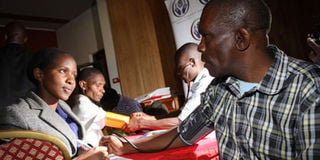Cases of diabetes have doubled in Kenya, warn experts

Miriam Ndege from Kenya Diabetes Management and information Centre (left) does a medical test to Fredrick Njuguna during the World Health Day 2016 at Silver springs Hotel Nairobi on April 7, 2016. PHOTO | ANTHONY OMUYA | NATION MEDIA GROUP
What you need to know:
- Today, one in every 17 Kenyans has diabetes, and 12,890 people in the country died from both diabetes and high blood glucose in 2014.
- Globally, the number of adults living with diabetes has almost quadrupled to 422 million in 2014 from 108 million in 1980, with most living in developing countries.
- According to experts, sedentary lifestyles, stress, being overweight and obese are some of the factors driving this dramatic rise.
The prevalence of diabetes in Kenya has more than doubled in the last three decades, accounting for 20 per cent of deaths in the country.
With a national prevalence rate of between 3.1 per cent and 4.6 per cent (between 1.4 million and 2.1 million Kenyans), experts are warning that the cases are rising at an alarming rate.
Today, one in every 17 Kenyans has diabetes, and 12,890 people in the country died from both diabetes and high blood glucose in 2014.
A report jointly published by the World Health Organisation (WHO) and Lancet on World Health Day last year, shows that the prevalence of diabetes in Kenya was six per cent in 2014, a 150 per cent rise from 2.4 per cent in 1980.
Globally, the number of adults living with diabetes has almost quadrupled to 422 million in 2014 from 108 million in 1980, with most living in developing countries.
STEP UP PREVENTION
So alarming is the situation that during the launch of the first Global Report on Diabetes WHO director general, Dr Margaret Chan, called for action on diabetes, saying there was need to step up prevention and treatment of the disease.
According to experts, sedentary lifestyles, stress, being overweight and obese are some of the factors driving this dramatic rise.
However, some people, especially those in rural areas, are affected by diabetes as a result of their genetic make-up.
“People are also not getting screened as often as they should. Some are not getting screened at all despite the test being cheap,” said Dr Eva Njenga, a diabetes specialist.
Experts note that the normal diabetes health advice — not smoking, eating a balanced diet, exercising regularly and limiting alcohol intake — can help keep people healthy.
SCREENING
Dr Njenga advises: “If you are not diabetic, ensure that you go for screening at least once a year. If any of the members of your family has diabetes, then you should be screened two to three times in a year, since you are genetically predisposed.”
Mr Zachary Ndegwa, a programme officer at the division of non-communicable diseases said, there are only 50 diabetes clinics and at least 12 specialists (endocrinologists) in Kenya.
“As we speak, it can take up to six months after the first booking for a patient to start their routine check-up,” said Dr Njenga.
Diabetes is a non-communicable disease in which the body’s ability to produce or respond to the hormone insulin is impaired, resulting in abnormal breakdown of carbohydrates and elevated levels of glucose in the blood and urine.
The most common diabetes symptoms include frequent urination, intense thirst and hunger, weight gain, unusual weight loss, fatigue, cuts and bruises that do not heal, male sexual dysfunction, numbness and tingling in hands and feet.
If not controlled, diabetes has dire consequences including possibility of heart attack, stroke, blindness, kidney failure and in other scenarios, gangrene, leading to leg amputation.





